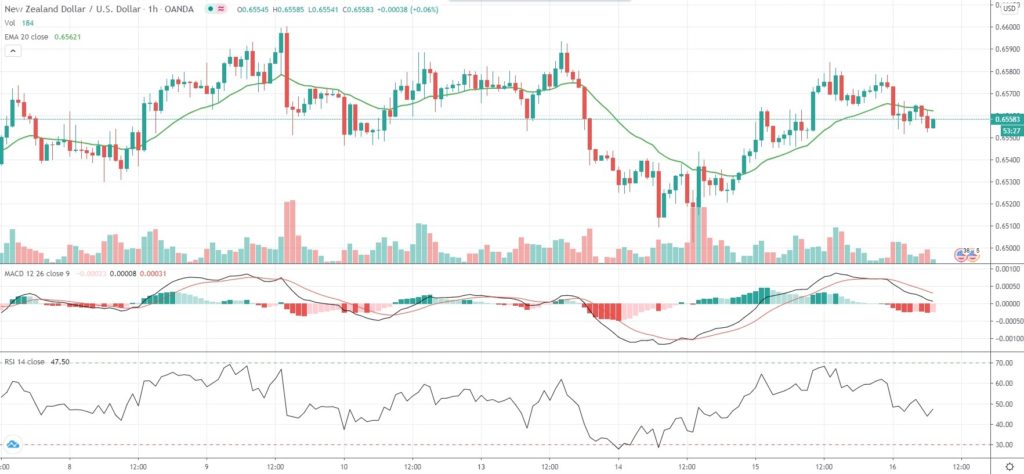NZD/USD retreated on Thursday, as mixed Chinese and domestic macroeconomic data did not support a move beyond the psychological 0.6600 level.
China, New Zealand’s largest trading partner, reported a faster-than-expected GDP growth during the second quarter, 3.2% year-on-year. However, retail sales unexpectedly shrank at an annualized rate of 1.8% in June, which marked the sixth consecutive month of decline as consumers continued to avoid crowded places such as shops, restaurants and cinemas due to the COVID-19 pandemic.
“While in general it’s fair to say that the numbers beat expectations, what the numbers also reveal is that we’re seeing that the China consumer remains behind,” National Australia Bank FX analyst Rodrigo Catril said.
“That cautiousness is something the market is looking at in terms of countries where the consumer plays a bigger role, so that’s obviously relevant for the U.S. as well.”
Meanwhile, an earlier report by Statistics New Zealand showed consumer prices in the country had dropped for the first time since Q4 2015 during the second quarter, by 0.5% compared to Q1. Annual consumer inflation decelerated to 1.5% during the second quarter of 2020 from 2.5% in the prior three-month period. Actual CPI data came in line with market consensus.
“Recessions kill inflation and we expect inflation to continue to fade over the remainder of this year and into next,” Mary Jo Vergara, an economist at Kiwibank, said.
“Deflationary pressure demands monetary policy to remain expansionary for the foreseeable future,” Vergara added, while suggesting a potential expansion of Reserve Bank of New Zealand’s bond purchasing programme.
In May, the central bank expanded quantitative easing to NZD 60 billion to include New Zealand Government inflation-indexed bonds.
As of 6:57 GMT on Thursday NZD/USD was edging down 0.25% to trade at 0.6555, while moving within a daily range of 0.6552-0.6578. The major pair has retreated 0.31% so far this week, following three successive weeks of gains. Kiwi’s recent move up encountered resistance at 0.6600 on July 9th, while the pair has failed to clear that level ever since then.
Today’s market focus will be on the monthly report on US retail sales at 12:30 GMT. Analysts on average expect a 5.0% monthly growth in sales in June, following a record 17.7% surge in May.
Additionally, core retail sales, which exclude large ticket prices and historical seasonality of automobile sales, are expected to increase 5.0% in June, following a record monthly gain of 12.4% in May.
A separate report by the Federal Reserve Bank of Philadelphia at 12:30 GMT may show manufacturing activity in the area increased at a slower rate in July from a month ago. The Philadelphia Fed Manufacturing Index probably came in at 20.0 in July, according to market expectations, down from a level of 27.5 in June. The latter has been the first positive reading since February, as the sub-gauges of shipments and new orders recovered from the area of contraction.
Also at 12:30 GMT, the US Labor Department will report on jobless claims. The number of people in the country, who filed for unemployment assistance for the first time during the business week ended July 10th, probably eased to 1,250,000, according to expectations, from 1,314,000 in the preceding week. Still, however, the latest number of claims exceeded the peak observed during the 2007-2009 financial crisis more than twice.
At 15:10 GMT Federal Reserve President for New York John Williams is scheduled to speak during an Office of Financial Research Advisory Committee meeting via webcast, while at 17:30 GMT Fed President for Chicago Charles Evans is expected to participate in a virtual presentation at the Rocky Mountain Economic Summit.
Bond Yield Spread
The spread between 1-year New Zealand and 1-year US bond yields, which reflects the flow of funds in a short term, equaled 9.7 basis points (0.097%) as of 6:15 GMT on Thursday, or unchanged compared to July 15th.
Daily Pivot Levels (traditional method of calculation)
Central Pivot – 0.6562
R1 – 0.6594
R2 – 0.6616
R3 – 0.6649
R4 – 0.6681
S1 – 0.6539
S2 – 0.6507
S3 – 0.6484
S4 – 0.6462






